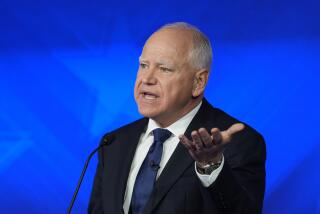Schwab Pale, Thin After 16 Months in Captivity : American’s Vietnam Quest--a Plan Gone Awry
- Share via
BANGKOK, Thailand — After 16 months as a prisoner of the Vietnamese, Robert W. Schwab III said Friday that he would use official channels and “not the South China Sea” if he ever again tries to rescue the girl he left behind.
Looking pale and thin the day after he was turned over to a White House official in Ho Chi Minh City, Schwab told a press conference here that he was never abused by his Vietnamese captors but was kept in solitary confinement throughout his ordeal and became “lonely and depressed.” The worst part, Schwab said, was being barred from telling his family or any other outsider what had become of him.
Schwab, a Vietnam War veteran, reconstructed his quixotic quest of April, 1985, when he sailed from the Philippines in a small boat for the Vietnamese coast.
His plan was to beach the craft, turn himself over to the authorities and “try to get permission for the girl I intended to marry to leave the country.” At the time, the Communist government was celebrating the 10th anniversary of the fall of the U.S.-backed government of South Vietnam, and he hoped Vietnamese good will and press coverage of his voyage would lead to her emigration.
Towed by Fishing Boats
Almost from the start, however, his plan went awry. Instead of beaching the boat, he was taken in tow by Vietnamese fishing boats. Fearing that his capture would spoil his hope of an “innocent” landing, he initially told the Vietnamese that he was bound for Singapore.
“I lost composure of thought. I lost freedom of movement,” the 44-year-old Schwab said. “I saw my bona fides going down the drain.”
Meanwhile, he said, he had “lost communication,” and the Western press was never alerted to his mission. As a result, he recalled ruefully, he found himself under suspicion of espionage.
Schwab said he was first interrogated in the coastal city of Qui Nhon, and then in Danang. After several weeks, he was moved to a prison in Ho Chi Minh City (formerly Saigon).
He was never allowed to see the girl, a teen-ager when Schwab was evacuated on the day Saigon fell to the Communists in 1975, and now about 30. He identified her only by a pseudonym to spare her embarrassment, he said. That pseudonym, he said Friday, is Mai, not Trai, as first reported.
Even the love story turned sour at the end. Schwab said he had received “some new information” about the woman. “That’s still undecided,” he replied when asked whether she was still his fiancee, refusing to disclose his information.
Schwab used the press conference to correct some information about his personal life. He is not, he said, a former officer or a Green Beret, as reported Thursday in some accounts of his release. He said he was a private first class in the Army Signal Corps and served only one year in uniform in Vietnam, in 1965. In the next decade, he was in and out of the country several times, working on aid or military-sponsored projects.
(In Washington, a U.S. official who asked not to be identified by name, said Friday that Schwab was a specialist in the languages of the Vietnam region, including that of the Montagnards, the mountain people of central Vietnam, and that he once worked there for U.S. Army intelligence. In Bangkok, Schwab insisted that he was never an intelligence operative.)
At the fall of Saigon, Schwab related, he was active in planning the evacuation of Americans there and of Vietnamese who had worked for or befriended the Americans. He said he planned to arrange the evacuation of the girl, but she was emotionally torn about leaving her family and decided not to go.
He later re-established written contact with her through Vietnamese refugees in Thailand. “She knew I was planning something,” he said, but he dared not give her any details.
2nd Girl Was Niece
He said he also intended to petition for the release of the woman’s niece. Reports Thursday said the second girl involved in his mission might be his daughter. “I don’t know where that came from,” he told reporters. The speculation came from an acquaintance in Hong Kong.
His mission “may have been illegal, but it wasn’t deceitful,” Schwab said, asserting that his plan was simply to tell the truth.
The Vietnamese accused him of violating territorial waters and national sovereignty, and finally released him after White House-level intervention and payment of a fine. It was paid by his family and the amount was not disclosed.
Appearing with Schwab at the press conference was Richard K. Childress, Asian affairs director of the U.S. National Security Council, into whose custody the Atlantan was released and flown to Bangkok in an Air Force plane.
Considering the length of Schwab’s imprisonment by the Vietnamese, Childress said, “the age of Rambo may have colored their thinking.” U.S. officials could not condone such missions, he declared, but “might understand . . . in the heart.” He said the release indicates “how far we have come in bilateral relations on humanitarian issues.”
But Childress said he saw no direct connection between Schwab’s release and continuing U.S.-Vietnamese talks on the question of accounting for Americans missing in action in the Vietnam War. He did say, however, that it was “an indicator that we will see further progress on this issue.”
Asked if he had seen anything in Vietnam to indicate that American servicemen might still be there, Schwab replied: “Nothing.”
More to Read
Sign up for Essential California
The most important California stories and recommendations in your inbox every morning.
You may occasionally receive promotional content from the Los Angeles Times.










